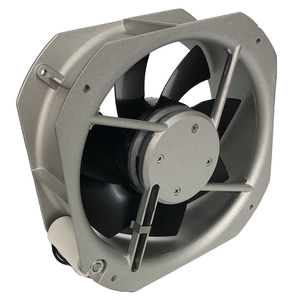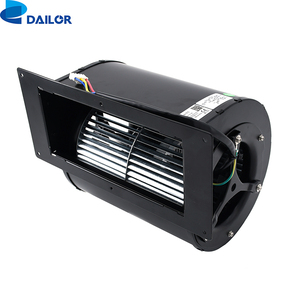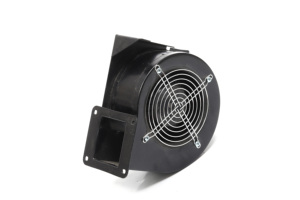(2285 products available)





















































































































































































Fans with metal impellers are preferred over other types for a variety of reasons. These fans come in a variety of shapes and sizes.
Centrifugal Metal Impeller Fan:
This fan creates static pressure and propels air in a radial direction. It is one of the most common types of fans with metal impellers. The exact design may differ from one model to the other, but generally, it consists of a housing, rotor, and outlet. The housing surrounds the rotor and also contains the air passage. The air comes out from the outlet. The support system in a centrifugal impeller is called the snail or trumpet. Its housing consists of a spiral-shaped section that gradually widens as the air exits the housing. The design and shape of the housing affects the airflow and pressure.
Axial Metal Impeller Fan:
An axial metal impeller fan is quite similar to a centrifugal metal impeller fan. The main difference lies in the direction of the airflow. While a centrifugal fan pushes air in a radial direction, an axial fan propels air parallel to the axis of the rotor. This fan consists of a rotor and a stator. The stator surrounds the rotor and contains coils of wire connected to an electric motor. An axial fan does not create pressure but moves air efficiently.
Belt Driven Metal Impeller Fan:
A belt-driven metal impeller fan transmits power through a belt and pulley system. One of the pulleys is fixed to the motor, and the other is attached to the fan. The fan can be installed easily in a system where it will be used at a fixed location. It cannot be used in an application where adjustability is needed.
Direct Drive Metal Impeller Fan:
A direct-driven fan is attached directly to the motor shaft. This results in a lightweight assembly with less operational noise. The drawback is that this type of fan will have a limited capacity for pressure generation.
Below are some scenarios in which industrial impeller fans may be used in industries.
Factory ventilation:
The metal impeller fan serves a major purpose in factories by providing ventilation. This is very important in industries such as welding, foundry, and chemical factories, where a large number of fumes are generated. The fans with metal impellers are usually mounted on the ceiling or upper part of the walls. They are used for the dilution of welding fumes and removal of chemical fumes from the ventilation channels. As a result, there is a constant supply of fresh air to the workers, which promotes their health and productivity.
Material handling:
In industries such as the cement, coal, and grain processing ones, there are bulk solid materials that need to be transported. Metal impeller fans are applied in those industries to pneumatically convey those materials. With the help of the fans, the bulk solid materials are swiftly moved through the pipelines. As a result, efficiency is improved, and the process becomes seamless.
Combustion air supply:
In industries with combustion processes, such as power generation and petrochemical ones, the propeller metal fans help to ensure that there is adequate air supply for the burning process. This is important because the efficiency of the equipment is boosted, and emission control is enhanced.
Cooling and freezing:\strong>
In the metallurgical industry and refrigeration ones, impeller fans can be used to provide cooling or freezing for equipment. Also, the fans can be used for product cooling. The fans do this by facilitating heat exchange. For example, in a refrigeration machine, the passing of refrigerant through the fins of the fan makes the air to be cooled. In the same vein, if there is a hot product in the industry, cooling it with the fan will promote rapid cooling.
Purchasers should consider the following aspects when buying metal impeller fans.
Applicability
Check the application environment. Determine if the chosen fan is suitable for the specific working environment. Pay attention to the fan's temperature, humidity, and presence of corrosive substances to ensure it can operate stably and safely in that environment. For instance, an industrial cooling fan should have a robust design and performance that meets industrial standards. It should also possess the ability to work under high-intensity conditions.
Functionality
Consider the required functions of the fan, such as cooling, ventilation, dust removal, etc. Different types of fans are tailored for distinct purposes. Select a fan that corresponds to the desired functions and meet specific needs. For example, a heavy-duty extract fan is designed to remove smoke and dust from the air. It may have a stronger power and higher airflow compared to an ordinary household extractor fan.
Quality
Choose a fan with a metal impeller that guarantees build quality. A well-constructed fan is more dependable and has a longer lifespan. It will also require less maintenance cost. Additionally, select fans that comply with international quality standards and possess certifications to ensure product quality.
Cost-performance
Consider the cost-performance ratio of the metal fan with an impeller. It doesn't necessarily have to be the most expensive. Instead, one should choose a fan that provides a good balance between performance and price according to budget constraints and practical requirements. Besides, the operating and maintenance expenses of the fan should be taken into account throughout its lifetime.
Brand
Choose reputable brands. These have proven track records in the market, reliable product quality, and comprehensive after-sales services. A worldwide accepted brand may have a better resale value.
Q1 Are metal impeller fans expensive?
A1 This depends on the type of fan in question. Small metal impeller fans are not that expensive. Industrial fans are heavier and bigger, thus will cost higher.
Q2 Do metal impeller fans make noise?
A2 The noise produced by a fan is influenced by several factors, including the design and build of the fan, its size, operating speed, and bearing type. Fans with metal impellers tend to make more noise than plastic impellers because metal operating at high speeds tends to be noisier.
Q3 How long do metal impeller fans last?
A3 An impeller fan made of metal can last a lifetime, provided it is well taken care of. Operating conditions can also influence the lifespan of the fan. If the working environment is not abrasive or high-temperature, the fan is likely to last for many years.
Q4 Can metal impeller fans be repaired?
A4 Depending on the damage, an impeller fan can be repaired. If there is minor damage like bearing replacement or any other light repair, then it can be repaired. If there are severe damages like the metal blades getting bent or the housing getting misaligned, then it cannot be repaired.
Q5 Are metal impeller fans safe?
A2 Metal impeller fans are generally safe. They are designed to manufacturer standards and comply with safety regulations. Safety also depends on how they are handled during installation and use.